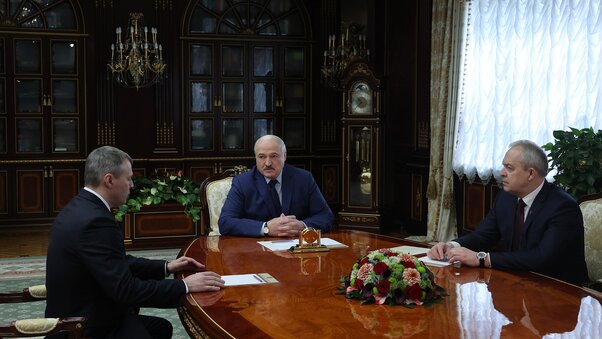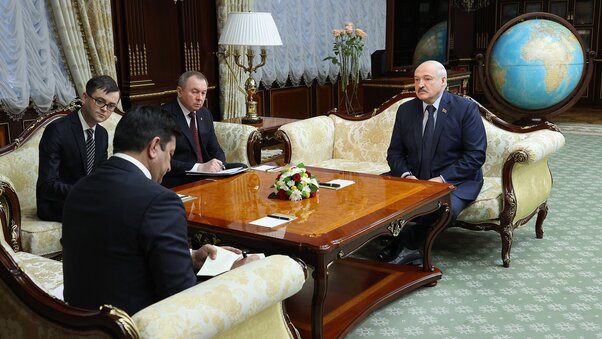Report of Healthcare Minister Dmitry Pinevich, Prosecutor General Andrei Shved, KGB Chairman Ivan Tertel
- 9
- 8:23
Belarusian President Aleksandr Lukashenko heard out reports of Healthcare Minister Dmitry Pinevich, Prosecutor General Andrei Shved and Chairman of the State Security Committee of Belarus (KGB) Ivan Tertel on 18 April.
“First of all, I would like to ask you a question that is partly philosophical, partly practical: how do wars begin? Today, I can prove within 5-7 minutes that injustice is the basis of any war, and corruption is the basis of injustice,” Aleksandr Lukashenko said.
The president emphasized that Belarus had always had a zero tolerance approach to corruption. “Every time I announce new appointments in this hall, I strongly warn the newly appointed officials against wallowing in corruption. This is unacceptable! Nevertheless, even in such an important area like healthcare, and also in other areas, we find people who violate anti-corruption laws,” the head of state noted.
Multiple Belarusian orthopedic surgeons have been charged with a number of crimes and have been arrested. The criminal case was discussed during the meeting hosted by the president. “I know the progress of this operation very well. I kept an eye on it. It didn’t start today or yesterday. I’d warned the healthcare minister about it. But as of today 35 people [have been arrested]. And I am convinced that more people should be arrested together with them. Nobody is going to dissuade me from it. They didn’t simply hint to people in need of surgeries what imported orthopedic replacement parts they need but took considerable bribes from foreigners. Sums as large as €300,000, €650,000 were found after searching some of their houses,” Aleksandr Lukashenko said.
When the healthcare minister asked what would happen to the arrested medics, Aleksandr Lukashenko invited Dmitry Pinevich to go to the pre-trial detention center and talk to each of them. The head of state said: “Are you telling me that you’ve personally approached every one of them? I’d like to decide on what we are going to do with these people in the presence of our key law enforcer – the prosecutor general. I know you wanted to bail them out. Not pardon them but vouch for them after they compensate for the huge damage the state has incurred. Send them to work in some organization at your discretion. Naturally in the field they’ve been trained. I am sad that the president’s doctor, who has repeatedly examined the president, is one of them. I am saddened by the fact but the law is the same for all.”
“The first question is what we are going to do with the half of a hundred people, who have been caught taking bribes from foreign frauds and ours, who represented German companies and other ones and split this money,” Aleksandr Lukashenko added. “I said I’d kept an eye on it for a reason. We detected this process a long time ago. And I didn’t want intelligence agencies to report it to me without proof. But when they gather up in a restaurant, drink alcohol and a representative of a foreign company hands out bribes in an envelope (naturally on camera) and when I get the report about it, what am I supposed to do? They should think how they should live from now on. We will try to decide on it today.”
The president expects this criminal case will teach a lesson to the Healthcare Ministry and the minister. “Because you know I hate putting up with it and the man at the wheel should be held accountable for it. I’ve talked about it more than once. This is why, Dmitry Leonidovich [Pinevich], I told you for a reason to go to the pre-trial detention center and deal with them on your own. We will see what you will suggest here,” the head of state said.
Aleksandr Lukashenko demands to establish direct supplies of medicines and medical products and to get rid of any intermediaries in order to prevent corrupt practices in healthcare. “We have to keep these matters [supply and use of medicines and medical products] under control. To keep them under control, get rid of all the intermediaries. I have said it a thousand times. Buy medicines and medical products directly from manufacturers. It can be done even during the period of sanctions,” the Belarusian leader said.
“Why didn't we do enough advertising for people who change a joint or something, and didn't import these products as part of a state program?” Aleksandr Lukashenko wondered.
According to him, it is not difficult to organize such supplies. In addition it will give the patients the opportunity to choose imported products and will not create grounds for corruption. “If someone believes that domestic products are of poor quality, then buy the imported ones. They used to buy and pay the triple price, because the price included bribes,” the head of state said.
The president was also briefed on the general situation in healthcare, including the epidemiological situation and COVID-19. “I see that our doctors who do not steal but work honestly and fight against COVID-19 show good results and their efforts are bearing fruit,” Aleksandr Lukashenko noted.
The president also discussed the use of medical equipment and the inadmissibility of equipment downtime. “People on the ground tell me that not all of your medical equipment (CT and so on) is in operation due to some malfunctions, and in some cases it does not work for two or three months. This is not okay,” the head of state noted.
In addition to that, the president gave an instruction to diversify suppliers of medicines in order to prevent shortages on the domestic market. “Saying that someone does not sell us something is a poor excuse... You know, medical equipment and medicines are not under strict sanctions. If the Americans don’t sell drugs to you, buy them in India, Cuba. It’s just a matter of maneuverability. Therefore, excuses for not having enough medicines or something else are not accepted,” the president said.
The head of state instructed Prosecutor General Andrei Shved to take the supply of medicines and other products under control: “You know how to do it. The same ways as you handled the loss of livestock. We need to take it under control and keep an eye on it so that the government does not become complacent. The only thing I ask the government to deal with is the economy. Economy, economy, the response to the sanctions - this is your area of responsibility, so go ahead and act. At least I do not limit the ministers in anything.”


